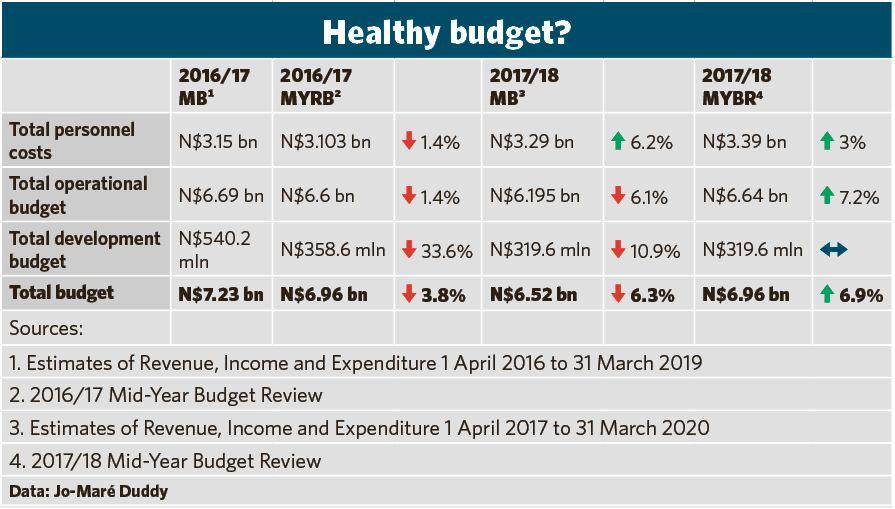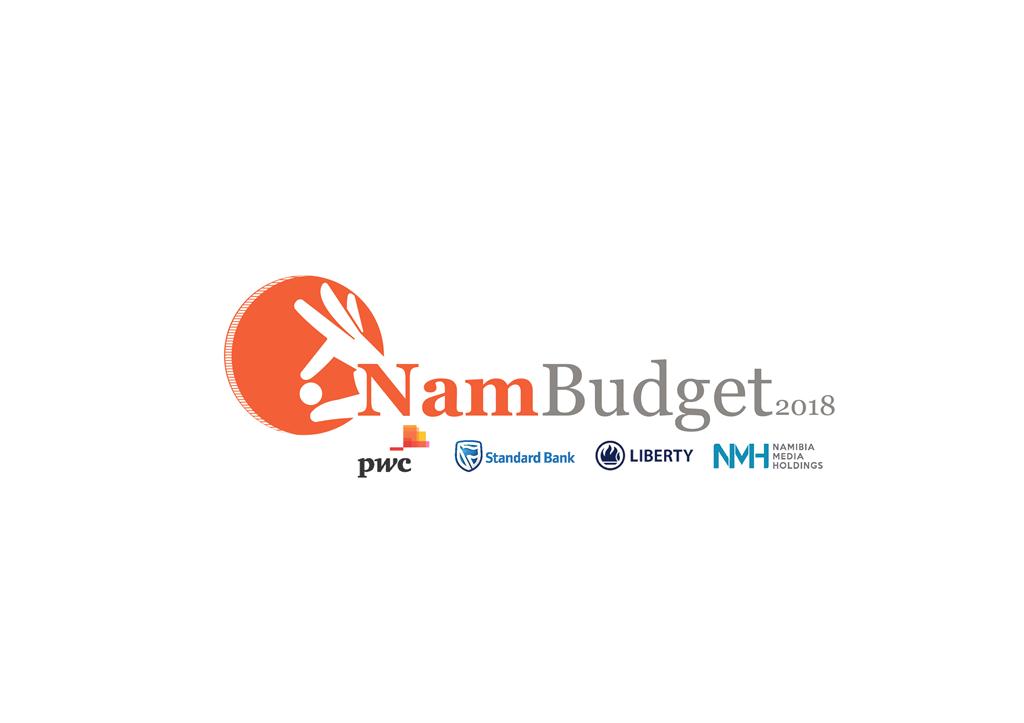Health in high care
Henriette Lamprecht - The Ministry of Health and Social Welfare’s dire financial situation will not change this year.
Dr. Bernard Haufiku last week pre-empted his ministry’s continuing financial woes which escalated last year and will most likely continue in the coming financial year – hopefully to a lesser degree.
Radical steps were taken to ensure the quality of healthcare remains a priority, including the reduction of overtime, buy-outs and even the purchase of much-needed ambulances.
The health sector’s biggest challenge was however the non- and late payment of claims by the state’s medical aid fund (Psemas).
The impact was brutal - especially on doctors and pharmacists in private practice in rural areas, where most patients were members of Psemas.
In the first few months of 2017, Psemas’ outstanding debt to service providers already amounted to N$500 million, with the government’s hold on the state purse ever so tight. To try and curb fraud which haunted Psemas for years, a special task team was formed to root out unscrupulous elements among service providers in the health sector once and for all.
Seven years before a forensic report indicated fraud already cost Psemas N$120 million per year. A follow-up revealed in 2009 the medical scheme then already surpassed its budget, while its expenses were the top five single biggest expense items of the Namibian government per individual ministry.
Haunted by this, the ministry of finance was determined to double check claims submitted.
Those providers who were identified as showing a huge spike in claims were hit with a double-edged sword. Until an investigation has proven no malice in the amounts claimed, all payments were indefinitely halted, leaving those on the right side of the law even further in a state of limbo. By July the ministry of finance had paid out approximately a billion Namibian dollars to service providers of Psemas since March. This was however a case of too little too late for some providers who struggled to make ends meet in months without payment.
Ethics
In March the country’s biggest pharmaceutical wholesaler declared no medicine, including chronic and emergency, would enter Namibia should the situation around Psemas payments not be rectified immediately.
According to NamPharm (Pty) Ltd late or non-payers already exceeded the company’s monthly purchases, amounting to approximately N$50 million for the period 90 to 120 days, said Marius Gouws.
It came down to an ethical issue, said Gouws, still providing emergency and much-needed medicine that could save lives or closing a supplier’s account to save the company from ruin.
Doors shut
By the end of 2017 the Pharmacist Association of Namibia (PSN) revealed at least eight pharmacies had to close its doors due to the Psemas debacle, while others had to let most of their staff go.
“Young professionals at the start of their careers were put in debt, couldn’t repay loans or support their families,” said Mr. Benjamin Khumalo. According to the Namibian Private Practitioners Forum (NPPF) practices in rural towns left state patients to seek medical advice elsewhere as some could no longer afford even basic medicine.
Training a no go
With a tight purse, one of the biggest casualties was training much-needed healthcare providers for a country of which the doctor-patient ratio among others was already not in line with that prescribed by the World Health Organisation (WHO).
A lack of skilled medical staff has time and again been singled out as one of the biggest obstacles in the ministry’s drive to deliver quality healthcare to all Namibians.
With its current structure more than two decades old and not in line with an ever-growing population, the cash-strapped ministry could only fill 89% of its posts.
Training at all health facilities, as well as training programmes in the Ministry of Health, were halted. This included the training of healthcare workers, vital for reaching those in especially rural areas where facilities are few and far between, as well as registered nurses. Neither were any Namibian students sent abroad for studies in health-related fields.
Students already studying in among others Russia also felt the pinch, with their monthly allowances several weeks in arrears.
“Setbacks experienced by a lack of funds by the Ministry of Finance” got the blame.
No money, no intern
Funds also dried up for graduates who had to complete an internship at an approved health facility before they could register at the Health Professions Council of Namibia (HPCNA) to practice as either a doctor, dentist of pharmacist. In this case the reasons were twofold – health facilities were not sufficiently upgraded to training status, while funds were lacking to pay interns’ salaries.
Unprecedented shortages
State patients again felt the brunt when those in need of a hip or knee replacement were left to buy prostheses themselves as payment to suppliers were months in arrears.
Basic supplies like theatre garments, gloves and needles at the three biggest hospitals were no longer a given, while a tender for linen and bandages was not even awarded, according to a regular supplier.
In an unprecedented move, surgeons at the three busiest hospitals complained about the lack of supplies - from catheters to gloves. Infrastructure was in dire need of maintenance with air conditioners in theatres sometimes reaching 30 degrees.
With access to quality health care every citizen's right, it seems unlikely that current conditions will in future prove this as a given.
Dr. Bernard Haufiku last week pre-empted his ministry’s continuing financial woes which escalated last year and will most likely continue in the coming financial year – hopefully to a lesser degree.
Radical steps were taken to ensure the quality of healthcare remains a priority, including the reduction of overtime, buy-outs and even the purchase of much-needed ambulances.
The health sector’s biggest challenge was however the non- and late payment of claims by the state’s medical aid fund (Psemas).
The impact was brutal - especially on doctors and pharmacists in private practice in rural areas, where most patients were members of Psemas.
In the first few months of 2017, Psemas’ outstanding debt to service providers already amounted to N$500 million, with the government’s hold on the state purse ever so tight. To try and curb fraud which haunted Psemas for years, a special task team was formed to root out unscrupulous elements among service providers in the health sector once and for all.
Seven years before a forensic report indicated fraud already cost Psemas N$120 million per year. A follow-up revealed in 2009 the medical scheme then already surpassed its budget, while its expenses were the top five single biggest expense items of the Namibian government per individual ministry.
Haunted by this, the ministry of finance was determined to double check claims submitted.
Those providers who were identified as showing a huge spike in claims were hit with a double-edged sword. Until an investigation has proven no malice in the amounts claimed, all payments were indefinitely halted, leaving those on the right side of the law even further in a state of limbo. By July the ministry of finance had paid out approximately a billion Namibian dollars to service providers of Psemas since March. This was however a case of too little too late for some providers who struggled to make ends meet in months without payment.
Ethics
In March the country’s biggest pharmaceutical wholesaler declared no medicine, including chronic and emergency, would enter Namibia should the situation around Psemas payments not be rectified immediately.
According to NamPharm (Pty) Ltd late or non-payers already exceeded the company’s monthly purchases, amounting to approximately N$50 million for the period 90 to 120 days, said Marius Gouws.
It came down to an ethical issue, said Gouws, still providing emergency and much-needed medicine that could save lives or closing a supplier’s account to save the company from ruin.
Doors shut
By the end of 2017 the Pharmacist Association of Namibia (PSN) revealed at least eight pharmacies had to close its doors due to the Psemas debacle, while others had to let most of their staff go.
“Young professionals at the start of their careers were put in debt, couldn’t repay loans or support their families,” said Mr. Benjamin Khumalo. According to the Namibian Private Practitioners Forum (NPPF) practices in rural towns left state patients to seek medical advice elsewhere as some could no longer afford even basic medicine.
Training a no go
With a tight purse, one of the biggest casualties was training much-needed healthcare providers for a country of which the doctor-patient ratio among others was already not in line with that prescribed by the World Health Organisation (WHO).
A lack of skilled medical staff has time and again been singled out as one of the biggest obstacles in the ministry’s drive to deliver quality healthcare to all Namibians.
With its current structure more than two decades old and not in line with an ever-growing population, the cash-strapped ministry could only fill 89% of its posts.
Training at all health facilities, as well as training programmes in the Ministry of Health, were halted. This included the training of healthcare workers, vital for reaching those in especially rural areas where facilities are few and far between, as well as registered nurses. Neither were any Namibian students sent abroad for studies in health-related fields.
Students already studying in among others Russia also felt the pinch, with their monthly allowances several weeks in arrears.
“Setbacks experienced by a lack of funds by the Ministry of Finance” got the blame.
No money, no intern
Funds also dried up for graduates who had to complete an internship at an approved health facility before they could register at the Health Professions Council of Namibia (HPCNA) to practice as either a doctor, dentist of pharmacist. In this case the reasons were twofold – health facilities were not sufficiently upgraded to training status, while funds were lacking to pay interns’ salaries.
Unprecedented shortages
State patients again felt the brunt when those in need of a hip or knee replacement were left to buy prostheses themselves as payment to suppliers were months in arrears.
Basic supplies like theatre garments, gloves and needles at the three biggest hospitals were no longer a given, while a tender for linen and bandages was not even awarded, according to a regular supplier.
In an unprecedented move, surgeons at the three busiest hospitals complained about the lack of supplies - from catheters to gloves. Infrastructure was in dire need of maintenance with air conditioners in theatres sometimes reaching 30 degrees.
With access to quality health care every citizen's right, it seems unlikely that current conditions will in future prove this as a given.









Kommentaar
Republikein
Geen kommentaar is op hierdie artikel gelaat nie